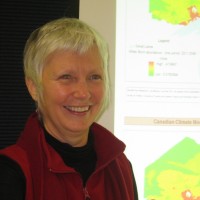
Kathryn Lindsay
Adjunct Research Professor, Landscape Science Sr. Advisor
| Degrees: | B.Sc. (Queen's), Ph.D. (Carleton) |
| Phone: | 613-998-7385 |
| Email: | kathryn.lindsay@glel.carleton.ca |
| Office: | National Wildlife Research Centre Environment Canada 1125 Colonel By Dr. (Raven Road) Ottawa, ON K1A 0H3 Ottawa ON |
Research Interests
I have conducted future scenario and wildlife risk assessment studies at local to national scales in Canada, the USA and Panama to understand the impacts of different land cover/land use on birds and other wildlife, and to explore approaches for incorporating biodiversity conservation into decision making. I am particularly interested in enhancing the capacity of multi-species approaches to influence policy, conservation and resource management at local to international scales, including in relation to climate change.
My recent university research questions include:
- Effects of farmland heterogeneity on biodiversity conservation
- The use of systematic reserve design for conservation planning
- The landscape ecology of species-habitat relationships
- The use of alternative futures for land-use planning
- The role of governance in sustaining ecosystem services
- Conservation implications of projected species range shifts from climate change
Selected Publications
Naujokaitis-Lewis, I.R., J.M.R. Curtis, L. Tischendorf, D. Badzinski, K. Lindsay and M.J. Fortin. 2013. Uncertainties in coupled species distribution–metapopulation dynamics models for risk assessments under climate change. Diversity and Distributions 19: 541–554.
Lindsay, K.E., D.A. Kirk, T.M. Bergin L.B. Best, J.C. Sifneos and J. Smith. 2013. Farmland heterogeneity benefits birds in American Mid-west watersheds. American Midland Naturalist 170: 121-143.
Pasher, J., S.W.Mitchell, D.J.King, L.Fahrig, A.C. Smith and K.E.Lindsay. 2013. Optimizing landscape selection for estimating relative effects of landscape variables on ecological responses. Landscape Ecology 28: 371-383.
Quesnelle, P.E., L. Fahrig and K.E. Lindsay. 2013. Effects of habitat loss, habitat configuration and matrix composition on declining wetland species. Biological Conservation 160: 200–208.
Melles, S., M.-J.Fortin, D. Badzinski and K. Lindsay. 2012. Relative importance of nesting habitat and measures of connectivity in predicting the occurrence of a forest songbird in fragmented landscapes. Avian Conservation & Ecology 7(2): 3. [online] http://dx.doi.org/10.5751/ACE-00530-070203
[top]